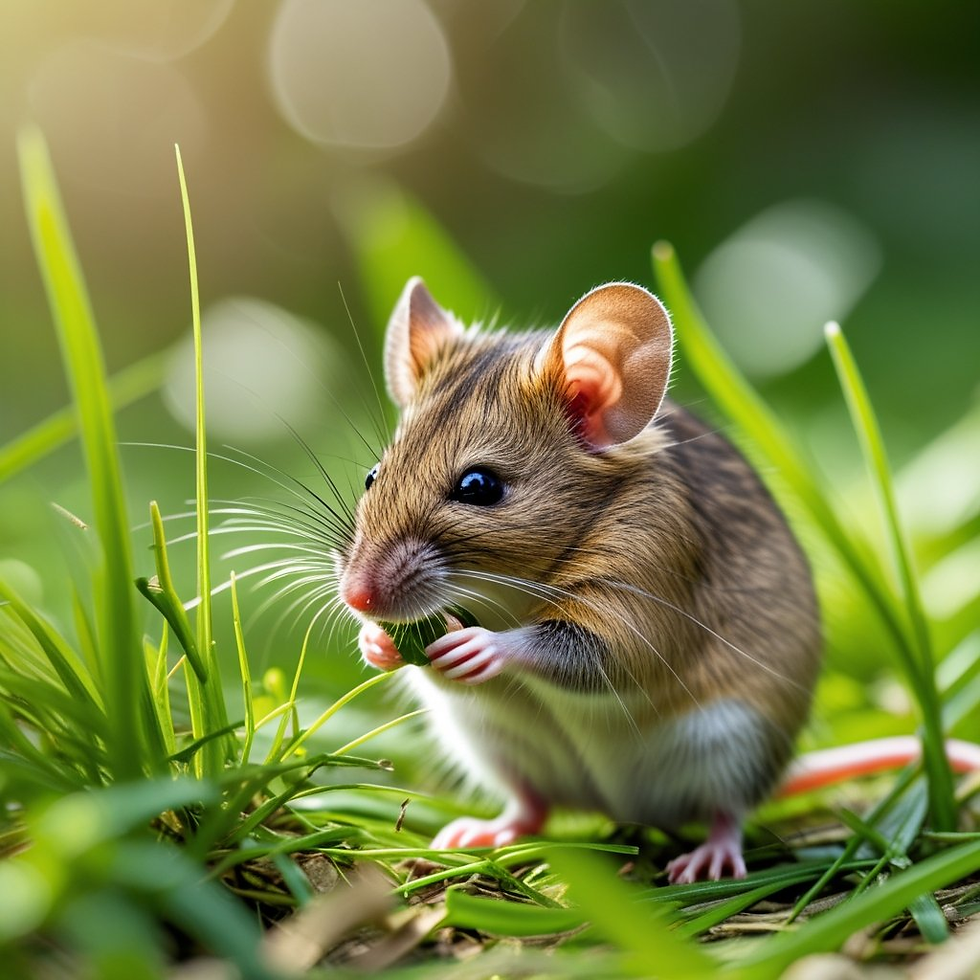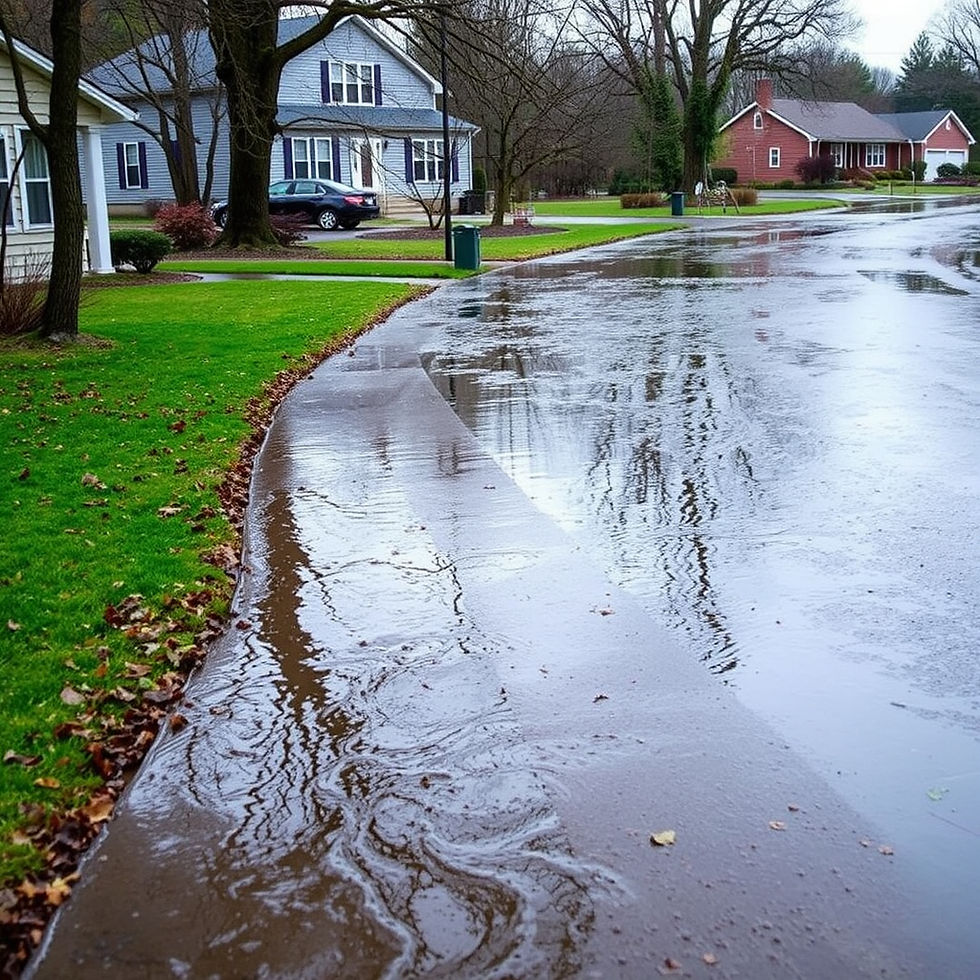Do Mice Eat Grass? A Deep Dive into Mouse Diets and Yard Behavior
- Jayant Upadhyay
- Jul 20
- 5 min read

Table of Contents
Introduction: Mice and Their Natural Diet
Do Mice Eat Grass? Quick Answer
Why Mice Might Be in Your Yard
What Mice Typically Eat in the Wild
Do Mice Damage Lawns by Eating Grass?
Do Mice Eat Grass Seeds or Sprouts?
Grass-Like Plants Mice Do Eat
Do Pet Mice Eat Grass?
Mice vs. Voles: Who’s Really Eating the Lawn?
Mouse Behavior in Urban vs. Rural Settings
Signs Mice Are Eating Your Grass
Are Mice Harmful to Your Lawn or Garden?
Can Mice Survive on a Grass-Only Diet?
How to Stop Mice from Damaging Your Grass
Natural Deterrents and Humane Control
Long-Term Yard Maintenance Tips
Final Thoughts
1. Introduction: Mice and Their Natural Diet
Mice are among the most adaptable creatures on the planet. Whether living in a city alleyway or a lush suburban garden, they find ways to feed, nest, and thrive. But as a homeowner, you might wonder: Do mice eat grass? Or are they just hiding in it?
Understanding what mice eat can help you manage rodent activity in your yard—and prevent damage before it happens.
2. Do Mice Eat Grass? Quick Answer
Yes, mice can and do eat grass—but it's not their primary food source.
Grass is usually consumed:
In small amounts
When other food is scarce
As part of seedheads or soft shoots
Alongside grains, fruits, and insects
Most of the time, mice will prefer other calorie-rich foods over grass itself.
3. Why Mice Might Be in Your Yard
If you’re noticing mouse activity near your lawn, it might not be the grass they’re after.
Mice are often drawn to:
Birdseed or pet food left outside
Compost piles
Unsealed garbage
Water sources
Dense vegetation or mulch (for cover and nesting)
Gardens with vegetables or fruit
They may chew on grass incidentally while searching for seeds, worms, or shelter.
4. What Mice Typically Eat in the Wild
Wild mice are omnivores with broad diets. They eat what’s available in their environment, including:
Seeds and grains
Berries and fruits
Insects, beetles, and larvae
Roots and tubers
Leaves and soft stems
Small snails or worms
While mice can nibble on green vegetation like grass blades, these aren’t highly nutritious compared to seeds or fruits.
5. Do Mice Damage Lawns by Eating Grass?
Direct damage by mice eating grass is rare but not impossible.
They may:
Chew on new grass shoots or seed sprouts
Clip grass to create nesting materials
Damage root zones if they burrow underneath
Create visible tunnels in the lawn (more common with voles)
But they usually don’t consume large quantities of mature grass like grazing animals would.
6. Do Mice Eat Grass Seeds or Sprouts?
Yes—this is much more likely than mice eating adult grass blades.
Why?
Grass seeds are nutrient-rich and small—perfect for mice.
Sprouting grass is soft and tender.
Mice often dig into newly seeded lawns at night.
If you’re reseeding your lawn and notice patches failing to grow, mice (or birds) might be the culprits.
7. Grass-Like Plants Mice Do Eat
While mature lawn grass isn’t their go-to food, mice do nibble on many grass-like plants, including:
Wheatgrass
Young cereal crops (barley, oats)
Wild grasses with seedheads
Garden weeds like foxtail or crabgrass
They consume these for:
Their soft leaves
Moisture content
Easy-to-access seeds
This matters if your lawn has overgrown patches or weed infestations.
8. Do Pet Mice Eat Grass?
Pet mice raised on formulated diets can eat grass occasionally, but it’s not essential.
Safe grass types for pet mice (in moderation):
Organic wheatgrass
Barley grass
Timothy grass
Make sure:
It’s pesticide-free
Washed thoroughly
Introduced in small portions to avoid digestive upset
Indoor mice prefer seeds, grains, and vegetables, but a nibble of grass can be a good enrichment snack.
9. Mice vs. Voles: Who’s Really Eating the Lawn?
Many homeowners confuse mice with voles—and it’s often voles doing the damage.
Feature | Mice | Voles |
Tail | Long, hairless | Short, furry |
Diet | Omnivore | Mostly herbivore |
Lawn damage | Rare | Common (girdling, tunnels) |
Nesting site | Indoors or under structures | Underground, surface runways |
If you see shallow trails or chewed grass at the root, voles are the likely offenders—not mice.
10. Mouse Behavior in Urban vs. Rural Settings
Mouse behavior can vary greatly based on location.
Urban Mice:
Live in basements, garages, and sheds
Feed on human leftovers, trash, or pet food
Rarely eat grass unless desperate
Rural/Suburban Mice:
Nest in woodpiles, compost bins, and tall grass
May eat seeds, roots, and grass sprouts
Often burrow in or around gardens
In both settings, grass is more of a fallback food—not a primary choice.
11. Signs Mice Are Eating Your Grass
If you suspect mice are nibbling on your lawn, watch for:
Tiny bite marks on new grass shoots
Hollow or missing spots in freshly seeded areas
Mouse droppings (small, dark pellets)
Chewed plastic garden markers or sprinkler heads
Tunnels near the surface (though this may be voles)
Use motion-sensing cameras to confirm rodent activity if unsure.
12. Are Mice Harmful to Your Lawn or Garden?
Mice are generally not the main threat to your lawn—but they can still cause issues, such as:
Eating new seedlings in vegetable gardens
Nesting under lawn structures (sheds, grills)
Spreading disease if they contaminate garden produce
Attracting predators like snakes or owls
If mice population explodes, lawn damage becomes more likely—especially in mild winters.
13. Can Mice Survive on a Grass-Only Diet?
No—mice cannot thrive on grass alone.
Grass lacks:
Sufficient protein
Fat
Vitamins and minerals essential for rodents
Mice require a mixed diet and usually seek out seeds, bugs, and high-calorie foods. If they’re eating mostly grass, it's a sign of desperation or lack of options.
14. How to Stop Mice from Damaging Your Grass
Practical tips:
Remove food sources: Don’t leave pet food or birdseed outside overnight
Seal trash bins: Make sure they’re rodent-proof
Eliminate water puddles: Fix leaking sprinklers or hoses
Mow regularly: Tall grass offers hiding spots
Use underground fencing: Especially if you’ve had vole/mouse problems before
Protect seed beds: Use mesh or floating row covers over newly seeded areas
15. Natural Deterrents and Humane Control
Avoid harmful poisons or sticky traps if you’re dealing with outdoor mice.
Natural deterrents:
Peppermint oil: Mice dislike the smell
Used cat litter: Sprinkled near burrow entrances
Ultrasonic repellents: May help in enclosed yards
Predator urine: Available from garden centers (fox or coyote scent)
For humane control:
Use catch-and-release traps
Block off nesting sites under decks or sheds
Work with local wildlife services if overrun
16. Long-Term Yard Maintenance Tips
Keep mice out by making your lawn uninviting.
Aerate the lawn to prevent tunnels
Edge flower beds and pathways with gravel
Avoid thick mulch near home foundations
Store firewood at least 18 inches off the ground
Install fine mesh around crawl spaces or vents
Keep compost bins tightly sealed
By managing your outdoor space, you reduce the risk of mice making your grass their pantry.
17. Final Thoughts
So, do mice eat grass? Yes—but only in small amounts, and usually only when better food isn’t available.
Mice prefer seeds, grains, and insects over blades of grass. However, if your lawn is freshly seeded or overgrown, they might take interest.
The good news is that mice rarely cause significant lawn damage unless their population gets out of control or they’re confused with voles. With regular yard maintenance and a few natural deterrents, you can keep your lawn mouse-free and lush year-round.
FAQs
Q: Do mice eat grass clippings?A: Not usually. Clippings dry out quickly and offer little nutritional value.
Q: Can mice live in artificial grass?A: Yes—especially if there’s food, cover, or water nearby. They may burrow underneath if the base is soft.
Q: Are mice bad for vegetable gardens?A: Yes. They’ll eat seeds, roots, and young sprouts.
Q: Should I use poison to get rid of mice?A: Not recommended outdoors. It risks harming pets, wildlife, and contaminating soil.



Comments